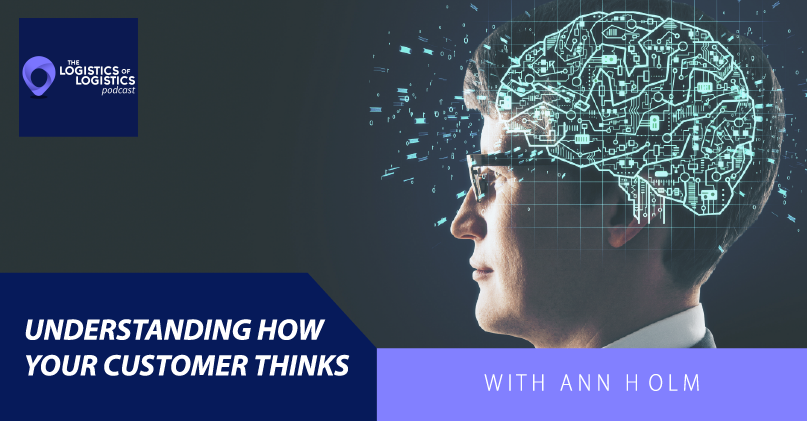Ann Holm and Joe Lynch discuss the way to understanding how your customer thinks. Ann is a Professional Certified Coach specializing in executive, leadership, and personal development.
[00:20] Opening / Introduction
[02:50] What is the one thing your clients get that they did not expect?
- Understanding how your customer thinks.
- Knowing the varying temperaments will assist in understanding the differences between how people think. It’s easy to remember, and the tips are immediately helpful.
- All customers think differently; however, temperament is being able to take a calibrated guess on how they will feel.
[05:20] How many different temperaments do you get to teach us about today?
- There are four; just like the directions on a compass.
- The Greeks came up with temperament; the modern-day version has its roots in the Myers-Briggs personality assessment. From the 16 personalities, you can group them into four temperament categories.
[07:30] Tell us about the four types of temperaments.
- Traditionalist/Guardian: they make up forty percent of the population. Risk-averse and tend to like much structure.
- Experiencer/Artisans: they make up thirty percent of the population. They are looking for something efficient and straightforward.
- Theorist/Conceptualizer: they make up fifteen percent of the population. Silicon Valley mindset, often thinking of technological innovation.
- Idealist: they make up fifteen percent of the population. They are interested in personal development and may get jobs in human resources.
[11:45] Take us through each one of these groups and how to identify them.
- [12:50] 1. Traditionalist: Someone like Warren Buffett, they tend to be very detailed and step-by-step. They look at the facts and past performances and are very time conscious. For instance, if a traditionalist says they have fifteen minutes to talk with you, that does not mean twenty minutes. Others may think of them as rigid because they are so time conscious. Generally, traditionalists are not about small talk; they want you to get to the point. Corporate America is absolutely a traditionalist structure; getting from one job to another is based on past performance.
- [16:40] 2. Experiencer: They are calibrated toward making things simple and efficient with a tangible payoff. For example, Richard Branson, the English business magnate behind the Virgin Group is an experiencer. Some adjectives to describe this group are fun and playful; Richard Branson seems like a fun person to work for. They are much more relaxed than the traditionalist, less time efficient, and more playful. Perhaps they go out for a couple of beers or go golfing to talk business.
- [20:50] 3. Theorist: These people tend to be long-term and strategic in their thinking. They are often looking at cutting-edge things; not something that has worked before, but something that will be the thing five years from now. For example, Flexport is a company with a theorist mindset. They are giving solutions that will take time to implement now, but long-term will work. Elon Musk is another example of a theorist. There is a lean toward wanting to debate, they will argue with many of your ideas in a meeting, but later could decide they want to implement those ideas.
- [25:40] 4. Idealist: Individuals are often in sales and tend to be authentic, collaborative, and are constantly learning. They are also relationship oriented and truly believe in the products they are selling.
[28:30] Give us four quotes, and we will decide which temperament said it.
- “Complexity is your enemy.” -Experiencer (Richard Branson)
- “If the future doesn’t include being out there among the stars and being a multi-planet species, it’s incredibly depressing.” -Theorist (Elon Musk)
- “So why do I talk about the benefits of failure? Simply because failure meant a stripping away of the inessential. I stopped pretending to myself that I was anything other than what I was.” -Idealist (J.K. Rowling)
- “I don’t look to jump over 7-foot bars: I look around for 1-foot bars that I can step over.” -Traditionalist (Warren Buffett)
[32:15] How to recognize and best engage each temperament as it relates to our customers.
- Traditionalist: Time efficient and low-risk. Engage this customer by making sure you have facts about past performance.
- Experiencer: Playful but straightforward and efficient. Engage this customer by keeping it brief, but prove that you know the details.
- Theorist: Long-term thinkers and strategic. Keep it high-level and talk about the big picture, add as few details as possible; they want to connect the dots themselves.
- Idealist: They want to be collaborative and make sure everyone is on the same page. Engage this customer by speaking about future goals, the big picture, and try being more personable.
Learn more:
Ann’s Twitter profile: https://twitter.com/AnnholmNet
Ann’s LinkedIn profile: https://www.linkedin.com/in/annholmnet/
Contact Ann: https://www.annholm.net/contact-me/

